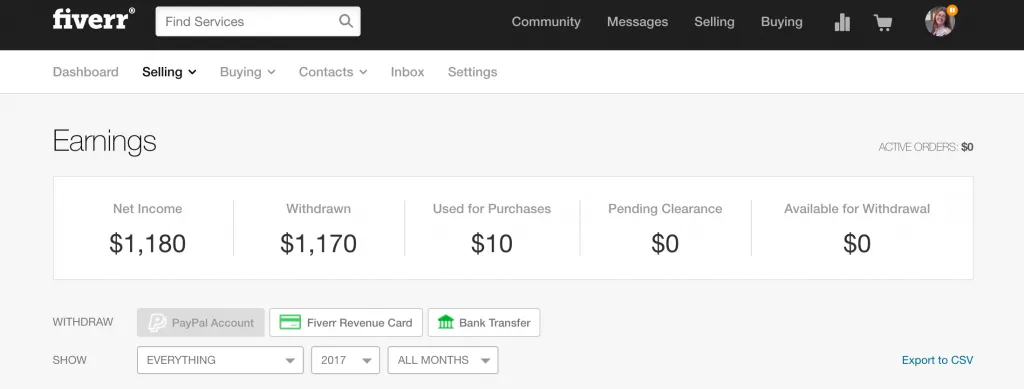When you’re earning money through freelancing platforms like Fiverr, it’s crucial to understand how those earnings are treated by the tax authorities. Many people wonder, "Is Fiverr income taxable?" The short answer is yes, but let's break down what that means for you as a freelancer. Whether you’re a graphic designer, writer, or marketer, knowing your tax obligations can save you a lot of headaches come tax season.
What is Fiverr and How Does it Work?

Fiverr is a popular online marketplace where freelancers can offer their services to clients all over the world. It operates under a simple premise: freelancers create “gigs” based on their skills, and clients can browse these gigs and hire freelancers for specific tasks. Here’s a closer look at how Fiverr works:
- Creating a Profile: To get started on Fiverr, freelancers must first create a profile. This includes details about their skills, experience, and areas of expertise. A well-crafted profile can make a big difference in attracting clients.
- Setting Up Gigs: Freelancers list specific services as gig offerings, detailing what they will deliver, how long it will take, and their pricing. These gigs can range from graphic design and writing to voiceovers and social media management.
- Client Interaction: Once a gig is live, clients can contact freelancers to discuss project details. Good communication is essential for successful collaboration.
- Order Fulfillment: After a client places an order, the freelancer completes the task according to the agreed terms. Once the work is delivered, the client can review it.
- Payment Processing: Fiverr takes a commission from the earnings, typically around 20%. The rest is transferred to the freelancer’s account once the client approves the work.
In summary, Fiverr is a user-friendly platform that connects freelancers with clients, making it easier to find work and get paid for your skills. But remember, those earnings are subject to taxes, so it's important to keep track of your income and understand your obligations as a freelancer.
Also Read This: Top 10 Marketing Strategy Planners on Fiverr
Understanding Taxable Income

When it comes to taxes, the term "taxable income" might feel a bit intimidating. But don't worry—let’s break it down into simple terms. Taxable income is essentially the portion of your income that is subject to taxation by the government. It includes wages, salaries, commissions, and, yes, even money earned through platforms like Fiverr.
Here are a few key points to understand about taxable income:
- Sources of Income: Taxable income can come from various sources, including freelance work, investments, and even side gigs. If you’ve earned money on Fiverr, it’s considered self-employment income.
- Deductible Expenses: Many freelancers don’t realize that they can deduct certain business expenses from their gross income, reducing their overall taxable income. This can include costs for software, equipment, and even a portion of your home office if you work from there.
- Tax Brackets: Your taxable income fits within specific tax brackets, which determine the percentage of tax you owe. The more you earn, the higher the percentage on the amount that exceeds certain thresholds.
So, if you’re earning money on Fiverr, this income is not just free-and-clear cash; it's something you need to report when you file your taxes. Keeping good records of your income and expenses can help you manage your tax liability and possibly reduce the amount you owe during tax season.
Also Read This: How to Do Mutual Cancellation on Fiverr
Tax Implications for Fiverr Sellers

You might be wondering, "What does this all mean for me as a Fiverr seller?" Well, let’s get into the specifics of the tax implications that come with your freelance work.
First off, it’s essential to know that if you earn more than a certain amount (typically $600) through Fiverr in a fiscal year, you will receive a 1099 form from Fiverr, which outlines your earnings. This form is crucial because it helps you report your income accurately to the IRS.
Here are some important tax implications you should consider:
| Aspect | Details |
|---|---|
| Self-Employment Tax | As a Fiverr seller, you are technically self-employed, which means you'll be responsible for paying self-employment taxes (Social Security and Medicare) on your earnings. |
| Estimated Taxes | Typically, freelancers need to pay quarterly estimated taxes, which can help you avoid penalties when tax season rolls around. |
| Business Expenses | You can deduct eligible business expenses, including marketing costs, software subscriptions, and even internet bills, which can ultimately lower your tax burden. |
| Record Keeping | Maintaining accurate records of your income and expenses is vital, both for managing your finances and for tax filing purposes. |
In summary, Fiverr earnings are indeed taxable, and it’s important to be proactive about understanding your tax obligations. If you're feeling overwhelmed, seeking advice from a tax professional could be a wise move. After all, a little preparation can go a long way in ensuring that your freelance income doesn’t become a source of stress come tax season!
Also Read This: How Do I Contact Fiverr Customer Service?
What You Need to Report on Your Taxes
When it comes to reporting your Fiverr income, it’s essential to understand what qualifies as reportable earnings. Generally, any income you make from freelance work, like the gigs you handle through Fiverr, is considered taxable income by the IRS. This applies to both U.S. citizens and residents. Here are the key components you need to consider:
- Total Earnings: Report all income earned through Fiverr. This includes earnings from various gigs, recurring clients, and even tips.
- 1099-K Form: If you earn over $20,000 and have more than 200 transactions in a year, Fiverr will send you a 1099-K form, which summarizes your earnings. Make sure to include this in your tax filings.
- 1099-MISC Form: If you earn less than $20,000 overall and receive payments through Fiverr, they may send you a 1099-MISC instead, especially if you've received payments from businesses.
- Business Expenses: You can also report any eligible business expenses incurred while earning your Fiverr income. This can include software, internet costs, or even a portion of your home office setup!
So, don’t overlook your Fiverr earnings; keeping track of what you make and any applicable expenses is crucial for accurate reporting come tax time.
Also Read This: What to Put in Your Fiverr Description: A Complete Guide
Tips for Keeping Track of Your Fiverr Income
Keeping track of your Fiverr income might seem overwhelming, but with a few tips and tools, you can simplify the process. Here are some strategies that can help:
- Use Accounting Software: Tools like QuickBooks, FreshBooks, or Wave can help you track income and expenses seamlessly. They often offer user-friendly interfaces that make managing your finances easier.
- Set Up a Separate Bank Account: Consider creating a distinct bank account for your Fiverr earnings. This way, you can easily monitor inflows and outflows related to your freelance work, keeping personal and business finances separate.
- Maintain a Spreadsheet: If you prefer a more manual method, create a simple spreadsheet to log your earnings and expenses. Include columns for dates, gig descriptions, amounts earned, and costs incurred.
- Keep Receipts: Save all your receipts for expenses related to your freelance work. Digital copies are perfectly fine and can help back up any deductions you claim on your taxes.
- Review Monthly: Set aside time each month to review your earnings and expenses. This will help you stay on top of your financial situation and will make tax season much less of a hassle.
Staying organized is key! The more you track your income, the less stressed you'll feel when tax season rolls around.
Also Read This: How to Start a Data Entry Job on Fiverr
Common Deductions for Freelancers
When you're a freelancer, understanding deductions is key to managing your taxable income. Deductions can significantly lower your overall tax bill, so let’s explore some of the most common ones that you might be eligible for.
- Home Office Deduction: If you use a portion of your home exclusively for work, you can deduct related expenses, such as rent, mortgage interest, utilities, and repairs. Just make sure to keep your work area separate from your living space.
- Equipment and Supplies: Any tools you buy to do your job, like computers, software, and other supplies, can be deducted. If it’s used solely for freelancing, you’re in the clear!
- Business Travel: Traveling for work? You can write off transportation costs, lodging, and meals. It's essential to keep detailed records of your business trips.
- Marketing and Advertising: Expenses related to promoting your services, like website hosting, business cards, and online ads, are deductible.
- Professional Fees: Any fees paid for services that help your business, such as legal or accounting fees, can also be deducted.
- Health Insurance Premiums: If you're self-employed, you can deduct the premiums you pay for health insurance, which can help reduce your taxable income.
Remember, as a freelancer, it’s essential to keep meticulous records of all your expenses. This will help you claim every possible deduction and reduce your taxable income, leaving you with more of your hard-earned money.
Also Read This: Can You Work on Fiverr Under 18?
Local and National Tax Regulations
When working as a freelancer, you have to navigate both local and national tax regulations. Understanding these rules is crucial to ensuring you meet your obligations and avoid any surprises come tax season.
At the national level, the IRS classifies freelancers as self-employed individuals. This means you’re responsible for paying self-employment tax, which includes Social Security and Medicare taxes. Here’s a breakdown of what you should consider:
| Tax Type | Description |
|---|---|
| Self-Employment Tax | As a freelancer, your earnings are subject to self-employment tax, which is 15.3% on net earnings. This includes both Social Security and Medicare contributions. |
| Estimated Taxes | Freelancers generally need to pay estimated taxes quarterly, since taxes aren’t withheld from your payments. |
On the local level, regulations may vary significantly. Considerations include:
- State Income Tax: Some states impose income taxes on freelancers, while others don’t. Make sure to check the rules in your particular state.
- Local Business Licenses: Depending on where you live, you may need permits or licenses to operate legally, particularly if you're running a business from home.
To ensure compliance, it's advisable to consult with a tax professional who can help you understand both local and national regulations. It’s not just about meeting your obligations; it’s about setting up a sustainable freelance career.
Is Fiverr Taxable Income? Understanding Your Tax Obligations
As a freelancer using Fiverr, it’s crucial to understand your tax obligations, particularly if you're earning a significant income on the platform. Freelancers generally operate as independent contractors, which means the income they earn is classified as self-employment income. This has specific tax implications, including how you report your earnings and the potential for additional taxes.
Here are some key points to consider regarding Fiverr income and taxes:
- Self-Employment Income: Income from Fiverr is considered self-employment income. This means you must report it on your tax return, usually on Schedule C (Form 1040).
- Threshold for Reporting: If you earn $600 or more in a year from Fiverr, you are required to report this income to the IRS.
- 1099-K Form: If you qualify, Fiverr may issue you a 1099-K form, which reports your earnings. This form should be included when filing your taxes.
- Deductions: As a freelancer, you may be eligible for various deductions, which can reduce your taxable income. Common deductions include:
- Home office expenses
- Software and tools
- Marketing costs
- Professional fees
Generally, freelancers must also pay self-employment tax, which covers Social Security and Medicare taxes. This tax is typically calculated using Schedule SE (Form 1040).
In summary, it’s important to keep accurate records of your Fiverr earnings and expenses to ensure that you comply with tax regulations and maximize your deductions.
In conclusion, Fiverr income is indeed taxable. Understanding your tax obligations and maintaining detailed records are essential steps to ensure compliance and potentially reduce your overall tax burden.



